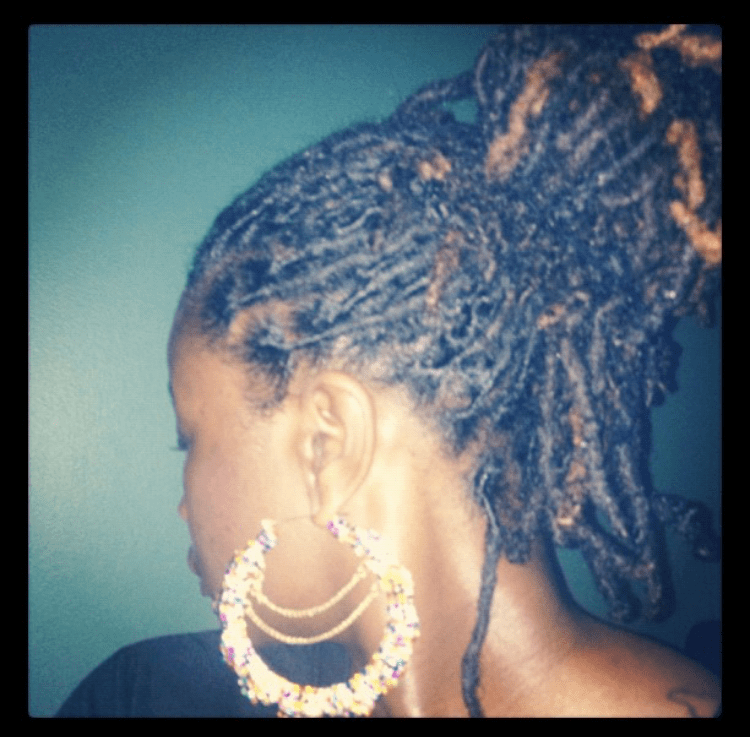
“I didn’t know they were bringing the Afro back”.
“I brought it back”, I quickly retorted.
Without missing a beat, the elderly black woman bagging my groceries said, ” You need to leave in the 70’s. None of my sons can bring home anyone that has that on their head”.
There are very few times I am shocked into silence. This was one of those times.
“No she did not just read me”, I thought to myself as the young, blond, blue-eyed checkout girl hurriedly apologized for her co-worker’s rude and unsolicited observations of my large, unruly, textured Afro. I don’t know what irked me more, “grandma’s” dismissal of my beautiful, thick Afro or a non-black person feeling the need to apologize on her behalf.
HAIR. Let’s get into it. Yes, hair is hair. At the most basic scientific explanation, hair is our body’s natural armor. It protects against our environment such as the sun, dust and even diseases such as malaria.
However, hair serves a much wider purpose in our lives, specifically the lives of women of color. Black women invest heavily in their hair. It doesn’t matter if one’s hair is “dyed, fried or laid to the side”.
We spend a lot of money on our hair (please disregard the assumption that natural hair is more affordable than wearing weaves or processed hair). As someone that has worn chemically straightened hair (always lying about the perm not burning to guarantee the straightest hair possible-we’ll go into this in another post), box braids, cornrows, double-strand twist, Nubian knots, and a classic permed wrap-it all cost money. And we black women happily pay!
Whether we have our weekly, bi-weekly or monthly hair appointments with our favorite stylist or whether we do our hair ourselves, there is big money to be made (and spent) as it relates to black hair care (Special shout out to @mrstetimus1 and @poochielious31 whom have worked wonders on my locs).
According to *Nielsen research, African-Americans spend well over $400 million dollars a year on their hair. Hair for me and many others is a way to express oneself. It’s like an accessory that is apart of your body. We perm, cut, dye, bleach, braid, loc, tease, roll, wrap and comb our hair in a myriad of styles. Not only is black hair a way to express oneself, it also may serve as a political statement.
Whether some know it or not, many women whom choose to wear their hair in it’s natural state are making a statement about how they view beauty and who’s beauty standard they may hold high.
Don’t get me wrong, every woman with an Angela Davis Afro does not mean she’s automatically “down for the cause” nor does having chemically processed hair mean you are “down for the fall”.
It is interesting to note that as a community we must deal with blatant discrimination based on our hair. There are students being barred from entering school if their hair is deemed “unruly” or a “distraction” to the white aesthetic. There has been court cases where black women have lost the right to wear their hair how they like as it relates to staying employed. The US Army just recently changed the hair standards to be more inclusive because up until very recently, some hair styles were deemed inappropriate. A young New Jersey student recently was forced to cut his locs in order to participate in a school wrestling match. There are endless examples of black hair being rejected by mainstream America.
And then of course, there is the wonder and awe often associated with black hair. When I rocked a large Afro, I received a lot of attention from non blacks. They would often approach me with starry eyed wonder as they tried to make sense of what was growing naturally from my scalp. This wonder has often left me and many others I know feeling violated when people (in their natural state of curiosity) choose not to ask permission and touch one’s hair.
That is the most inappropriate thing a person can do to another. This goes beyond race, I have experienced white and black people lunge toward my hair-like a fly to shit. Please, oh please-like Solange famously crooned: “Don’t touch my hair”.
Until next time, continue to hydrate and stay warm, it’s cold out here. Blessings.
SOURCE:
https://nypost.com/2018/12/22/mom-of-wrestler-forced-to-cut-dreadlocks-that-was-brutal/
As a result of our many conversations, related to this same subject of “hair”, I’ve become less judgmental and more understanding. As a “bald” young, yet handsome African American male, society has definitely impacted my view of self and others. That view was so impactful, it made me feel I should consider all types of methods to restore my hair. It was you that said, “I support you and whatever you decide to do, but your very beautiful the way you are too!” I have since tossed any ideas related to restoring my hair! I keep the hair oil on deck, and a low cut weekly. I failed to mentioned, when my hair grows back, it’s not exactly even! Call me Lebron James!! Nonetheless love who you are, and do whatever empowers you!! Thank you Anika for allowing me to see, that I shouldn’t judge the beauty of myself, based on other’s perception of what they feel beauty should look like.
>
LikeLike
Yes! Who cares if you have a baldy?! You’re still haaaaaawwwwwt!💋
LikeLike